 As tempting as it might be to always point fingers at the government and lay all the blame at the President’s door for the forex and fuel shortages, we as citizens, consumers and producers, must realise that we also contribute to this problem.
As tempting as it might be to always point fingers at the government and lay all the blame at the President’s door for the forex and fuel shortages, we as citizens, consumers and producers, must realise that we also contribute to this problem.
It is a fact that forex and fuel are connected, no forex means that Petroleum Importers Limited (PIL) cannot import fuel, leaving our service stations dry and motorist in a leaving hell. The major earner of forex for Malawi is tobacco, and unfortunately tobacco sales have not gone as expected meaning that the forex we were anticipating to come in and ease the country’s woes has not come in.
The President has long recognised that tobacco buyers have been giving us a raw deal and that tobacco in the long term will not be a reliable source of forex, therefore, he has called on us to diversify our economy and find other cash crops and goods that will be able to compliment or replace all together tobacco as the main forex earner.
Unfortunately Malawian industries and entrepreneurs have not risen to challenge leaving us in the same tight spot.
With that in mind I would like to put forward an argument stating that if we cannot find other means of bringing in forex, why not then save forex by stopping to import simple goods that we produce or can produce locally.
It is very sad to see that Malawians do not like to buy Malawians goods. Malawians are very hypocritical in the sense that we blame the President for forex shortages in the country, when we have an obsession of shopping in foreign stores and buying foreign goods, while forgetting that these foreign owned stores take forex from our country to import these foreign goods and the profit they make from the sales is not kept in the country but rather remitted back to their home lands.
We want to buy fancy foreign brands so that we can look classy and give the impression that we live fancy high class lives that are up to the very high standards of the world, which in truth are not in conformity with our economy and income.
It would be unfair and unprofessional to lay all the blame on the consumer. The producers and local stores must also take their share of the blame. I can understand a consumer if they were to argue that the reason they buy foreign products is because of the quality, and the reason they shop from foreign stores is because of their good hygiene and careful storage of goods.
Local manufacturers really are disappointing when it comes to the quality of their goods and standards of packaging, and many local stores do not store their goods properly or hygienically and many still keep expired goods on their shelves.
The main underlying argument of this article was that, we could save so much forex if we did not import so many goods. I must also back the consumer on this issue because there are just some goods that are not manufactured locally but that could be easily done.
For example ever since the government started the fertilizer subsidy programme, we have been recording a bumper harvest in maize production, with so much surplus maize, but unfortunately for us we cannot even make our own cornflakes, or corn chips.
I have heard a rumour that Malawi’s textile industry is quite good and we manufacture a lot of quality garments and clothing, but sadly what happens is that, a shirt is made in Malawi, and then sent to South Africa or the U.S, where a South African or American label is stitched onto it, and then we Malawians import that shirt back and go walking around proud showing off an American label on a shirt which was made in Malawi. ……to be continued





No comments! Be the first commenter?